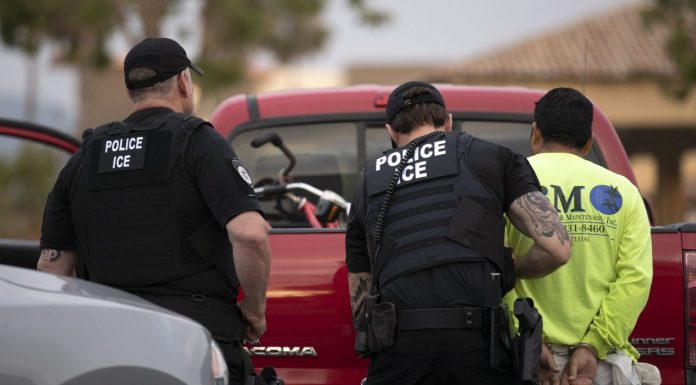(Headline USA) During the Trump administration’s final weeks, the Department of Homeland Security quietly signed agreements with at least four states that threaten to temporarily derail Democrat Joe Biden‘s efforts to open America’s borders.
The agreements say Arizona, Indiana, Louisiana and Texas are entitled to a 180-day consultation period before executive branch policy changes take effect.
The Biden administration rejects that argument on grounds that immigration is solely the federal government’s responsibility under the Constitution.
Former President Donald Trump relied heavily on executive powers for his immigration agenda because he was unable to build enough support for his policies in Congress.
Now some of his supporters say Biden is going too far in doing the same to reverse them.
The first legal test is in Texas, where the Republican governor and attorney general are challenging the Democratic president’s 100-day moratorium on deportations, which took effect Friday.
The Homeland Security Department told lawmakers shortly before Biden’s inauguration last week that it reached nine agreements, mostly with states, according to a congressional official speaking on condition of anonymity to discuss information that is not yet publicly available.
The department declined to comment, citing the lawsuit. The Trump administration, usually eager to trumpet immigration enforcement, stayed publicly quiet on the agreements, which were first reported by BuzzFeed News.
The nine-page agreements known as Sanctuary for Americans First Enactment, or SAFE, are expansive.
They require that state and local governments get 180 days’ notice of changes in the number of immigration agents, the number of people released from from immigration custody, enforcement priorities, asylum criteria and who qualifies for legal status.
The agreements say looser enforcement can hurt education, health care, housing and jobs.
Sheriff Sam Page of Rockingham County, North Carolina, on the Virginia border, signed an agreement on Dec. 22.
“Any incoming administration is likely to make changes in policy,” the sheriff said. “Policy changes at the federal level affect us on the local level. It is our hope that the SAFE agreement will foster timely communications about any significant forthcoming policy changes. We are simply asking for notice of these changes.”
Louisiana Attorney General Jeff Landry, a Republican, signed an agreement on Dec. 15 to “stem the tide of illegal immigration,” spokesman Cory Dennis said.
“While some may attempt to blur the lines, there is a difference between legal and illegal immigration, and it is important to recognize that,” he said. “Our office will continue to be a watchdog for any changes to immigration policies that may be detrimental to the people of Louisiana.”
In Indiana, former state Attorney General Curtis Hill, a Republican, signed the agreement on Dec. 22. Rachel Hoffmeyer, spokeswoman for Gov. Eric Holcomb, said it will remain in place after an initial review.
Katie Conner, a spokeswoman for Arizona Attorney General Mark Brnovich, confirmed that the state signed, saying it “has numerous cooperative agreements with federal, state and local enforcement agencies, including DHS.”
In addition to the deportation moratorium, the Biden administration suspended a policy to make asylum-seekers wait in Mexico for hearings in U.S. immigration court.
Six of Biden’s 17 first-day executive orders dealt with immigration, such as halting work on a border wall with Mexico and lifting a travel ban on people from several countries with ties to terrorism.
Adapted from reporting by the Associated Press.

